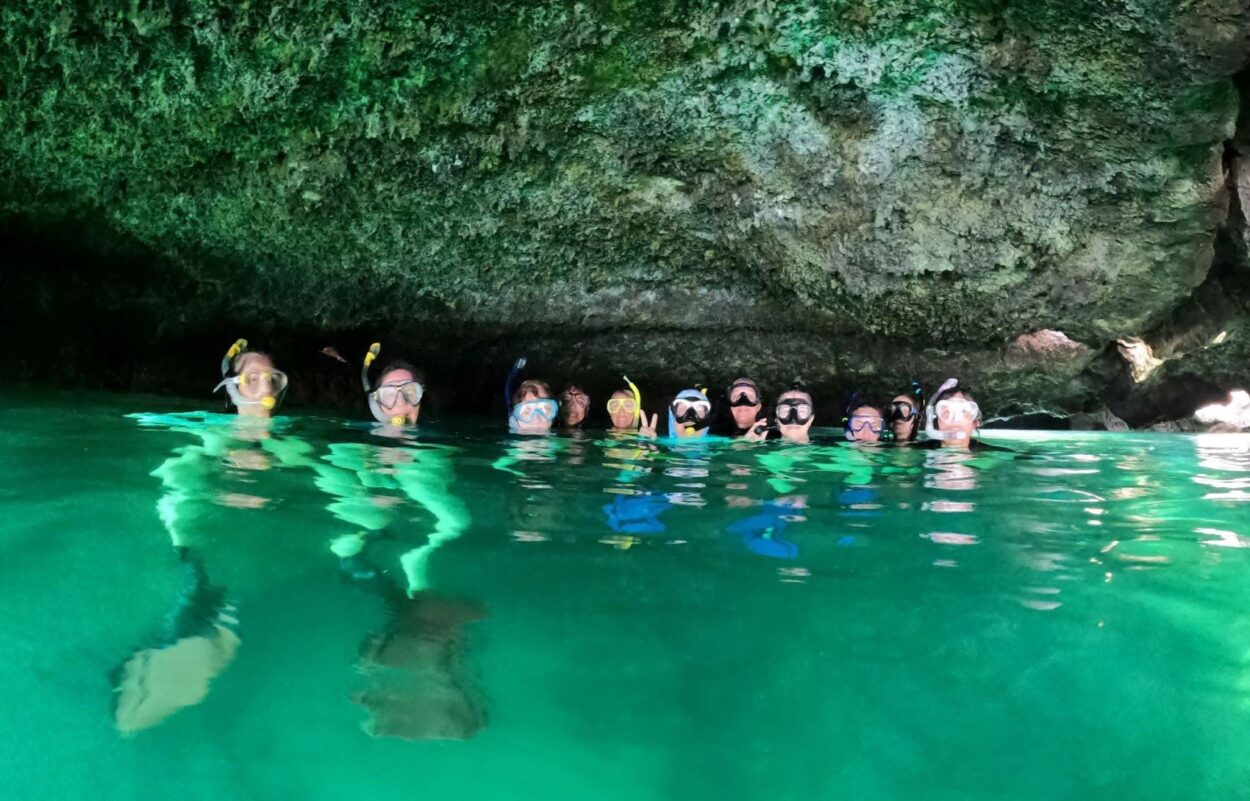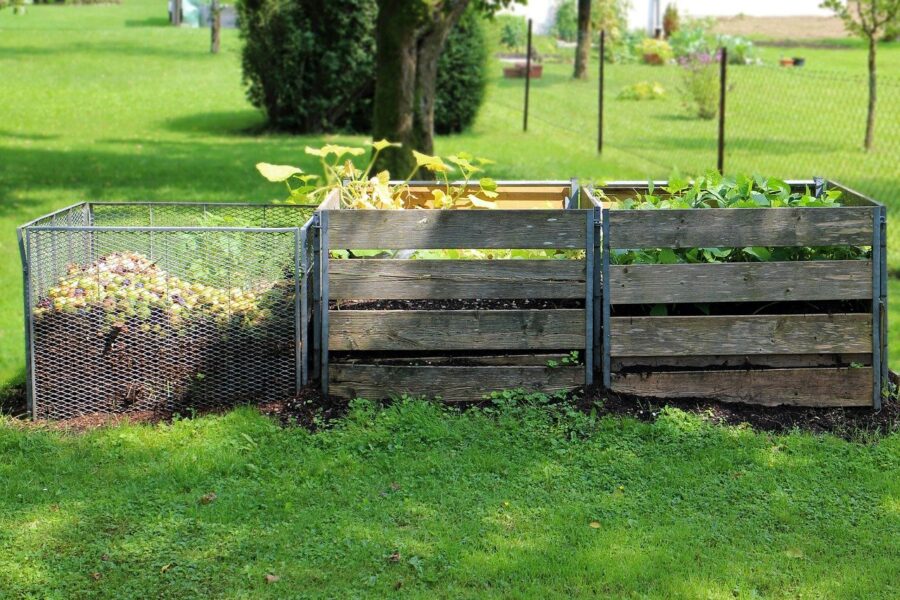A group of ten Antioch alumni recently embarked on a journey to the Galápagos Islands, aiming to immerse themselves in a week of exploration, hands-on learning, and reconnection. These women, who affectionately refer to themselves as the “Butterfly Tribe,” are accomplished and creative educators who share a profound love for the natural world and a strong commitment to fostering ecological awareness and advocating for social change. Their friendship has endured for 25 years, bound by their shared experience as Environmental Studies students at Antioch’s New England campus.
The adventurers were first dubbed the “Butterfly Tribe” when they graduated in 1998. Charged with arranging the decorations for the ceremony, this group of makers chose butterflies—an iconic symbol of transformation—as the theme. The centerpiece of the event was a five-foot chrysalis piñata crafted out of paper mâché. Bright emerald green flecked with gold, the piñata represented in exquisite detail the markings of a monarch butterfly pupa.
“Our last week of classes was a flurry of flapping butterfly wings,” Jessica Brainard says. “We folded dozens of origami butterflies and sourced the perfect thematic confectionary to fill the piñata, 10 dozen ‘Earth ball’ chocolates.” The finishing touch was a specially adorned stick made for cracking open the piñata. A triangular Delta donned the tip, a symbol of emerging from the protective shell of Antioch and setting out into the world to serve as positive change makers.”
Twenty-five years later, this kaleidoscope of “Butterflies” converged to experience one of the most biodiverse places on the planet. The Galápagos cohort included:
- Jessica Brainard ’98 (New England, MS), Interpretive Planning Consultant and Exhibit Developer-Writer, Smithsonian Institution
- Marcy Boyd (Greenberg) ’98 (New England, MS), Science Curriculum Designer focused on climate change and youth education
- Anna Kraftson ’98 (New England, MS), Learning Support Coach and Science Teacher
- Jen Kretser ’98 (New England, MS), Director of Climate Initiatives, The Wild Center
- Abigail Lynam ’98 (New England, MS), Core Faculty, Fielding Graduate University PhD in Human and Organizational Development program
- Vanessa Long ’98 (New England, MS), Executive Director for People Operations, University of Massachusetts Chan Medical School
- Charlene Saltz ‘98 (New England, MS), Sustainability Manager, Arizona Public Service
- Cydney Smith ’98 (New England, MS), Self-employed Holistic Life Coach and Yoga Teacher
- Michelle Simpson ’98 (New England, MS), Executive Director, Boys & Girls Club of Brattleboro
- Stephanie Smith ’98 (New England, MS), Principal, Zephyr Mangata Consulting
“This is a group of incredible women. We have a deep love of the outdoors, environmental science, ecology, cultural learning – and each other. We believe in the transformation of ourselves and those we work with for the health of the planet. We are spread across the U.S. and in jobs that range from environment, education, exhibit design, coaching, and more,” says Stephanie Smith.
Abigail Lynam, PhD, specializes in adult development, leadership development, transformative learning, and social and ecological change leadership. She described that in addition to the “beautiful relationships with this group of ten women, [the trip] was a chance to immerse ourselves in our love of nature—together in a wild and beautiful place that represents a profound biodiversity and unique expressions of the evolution of species.”
Lynam began her career by teaching at Geocommons in Auroville, India, followed by a decade-long tenure at Lesley University’s Audubon Expedition Institute. After completing her PhD, she led a sustainability program at Cascadia College and later joined Fielding Graduate University. Currently, she is involved in supporting changemakers through Pacific Integral programs.
Like her fellow travelers, Michelle Simpson was motivated to pursue her field of study and career path by her profound love for nature. Her quest for a comprehensive understanding of ecology and the world’s inner workings guided her academic choices. At Antioch, she discovered a community of kindred spirits dedicated to pioneering ideals in sustainability and addressing climate change. Today, boasting over two decades of experience in public and independent classrooms, Simpson stands as an esteemed educator, serving as Executive Director of the Boys & Girls Club of Brattleboro. Simpson has consulted with educational institutions in the United States, China, Dubai, and India, specializing in adopting hybrid teaching and learning models encompassing onsite, outdoor, and remote education.
“It felt like stepping into a real-life Jurassic Park—a truly untamed place where the focus was more on nature and less on humans,” described Simpson.
Their adventures took them to three inhabited islands, where they snorkeled alongside sharks, sea turtles, stingrays, and tropical fish. A hike up an active volcano on Isabela Island revealed one of the world’s largest calderas and captivating lava tunnels. Education was seamlessly integrated into every facet of the journey. They explored permaculture practices, visited the Chato Tortoise Reserve, and learned about the islands’ rich geological history. They acquired a deeper understanding of current management initiatives at the Charles Darwin Research Station, established to safeguard the Galapagos Islands through scientific research and conservation endeavors.
Cydney Smith is a self-employed Holistic Life Coach and Yoga Teacher who operates a well-being business founded on the principle that holistic health empowers better life choices and deeper connections. “We all have a natural curiosity about the local species and the environment,” says Smith. “We spent our days birdwatching, hiking, and immersing ourselves in learning. The entire experience was profoundly ecologically focused. What struck me the most was the sense of ‘Awe’ that permeated each day as we opened ourselves to deeper connections and experiences beyond our individual selves. Every moment was brimming with Awe—the stunning beauty, the unique species, the extraordinary environment, and the commendable ecological efforts of the islands!”
Highlights included visiting Floreana Island, where they absorbed its history as the first island with human inhabitants. A hike to Los Pulpos provided an opportunity to study marine iguanas, and a visit to the Galapagos National Park Giant Tortoise Breeding Center deepened their understanding of current conservation efforts to restore tortoise populations.
“There in Darwin’s laboratory—the birthplace of the theory of natural selection—I was reminded of the power of place and the nature of friendship. To thrive, friends must adapt to the ever-changing circumstances of life. To endure over time, we must support each other in our continuous evolution as individuals and as a collective,” says Jessica Brainard. Brainard is presently working with the National Air and Space Museum to develop, write, edit, and oversee exhibit content for a significant multi-year renovation project.
Biology Teacher Anna Kraftson was drawn to the Galapagos because of its connection to evolution theory. Kraftson was named Teacher of the Year at Queen of Peace HS and Naperville North High School, where she was an Illinois State Teacher of the Year Finalist in 2004. She also oversees science projects, introducing innovative NGSS curriculum at a high school of 2600 students and teaching science through storytelling, a concept she attributes to her experiences with Tom Wessels in the Plant Communities class at Antioch. “My curriculum and instruction classes were foundational to who I am as a science educator because it gave me the space to reflect on what I valued as well as the opportunity to learn the skills needed to teach the way I wanted in the classroom,” says Kraftson.
The women had many fond memories of mentors and their impactful courses, including Mitch Thomashow in Ecological Identity, Tom Wessels in Reading the Forest Landscape, mushroom hunting with Rick Van de Poll, interactive science with Jimmy Karlan, and hikes with Alesia Maltz. Maich Gardner’s Building a Sustainable Business was another favorite course.
“The systems thinking I learned at Antioch have played out in numerous ways throughout my career, even though not directly related to environmental studies. My most recent role is literally about building an ecosystem of connections within H.R. and throughout my university. My environmental training serves me well as a systems thinker,” says Vanessa Long. Today, as Executive Director for People Operations at the University of Massachusetts Chan Medical School, Long oversees the school’s Immigration Services Office, which is instrumental in attracting and retaining top scientists, faculty, medical professionals, and researchers.
The women credited Antioch for reinforcing their commitment to authenticity and connecting them with a community of like-minded individuals who share a deep passion for human connection. They also emphasized the diverse ways ecological and environmental efforts can be expressed, not limited to science but extending to art, culture, creativity, and the strength of human connections.
“My time at Antioch was transformative on so many levels, not the least of which is the deep friendships that formed with this incredible group of women. While our work in the world is so important, ultimately, it is our relationships that sustain and nourish us across our lifetimes. For me, the trip to Ecuador and the Galapagos was a chance to reconnect in nature and in a community, which is what brought us together to begin with. I’m so grateful for the experience and trip of a lifetime,” says Jen Krester.
Stephanie Smith expressed gratitude for the personal and professional growth and deep discussions that occurred on the trip: “Staying connected across the miles and years is a gift that is always giving back to us. I’m so grateful to Antioch for giving us a place to meet, connect, and intertwine our lives, which continue to grow together and blossom in deeply meaningful ways.” Today, Smith is dedicated to advancing positive change for both people and the planet, particularly in the areas of freshwater issues in the U.S. and Africa.
In the Galápagos Islands, these ten women discovered not only a haven for nature but also a profound wellspring of inspiration that fueled their joint commitment to social and ecological change. Their journey showcased the enduring power of their friendship that had developed over 25 years. As they left the Galápagos, the Butterfly Tribe carried with them the islands’ breathtaking beauty, the unique species they encountered, and their collective determination to positively impact the world.






